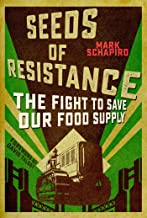 As our food supply is increasingly threatened by climate change, the importance of agricultural practices become more important and Mark Schapiro’s book, Seeds of Resistance, examines one of these: the control of the seed supply that is basic to growing food. Alarmed by the fact that three multinational chemical companies control more than one half the commercially used seed, the author goes on to explain the connection between seed ownership and pesticide production and to discuss the hazards of monoculture and the importance of genetically diverse seed to ensure future food security. Schapiro pays special attention to the role of GMOs in the rise of single-crop agriculture and the narrowing of seed diversity and explains the problems that will ensue if the present agricultural practices are continued. The author finds hope, however, in the fact that many people and groups are becoming more aware and active in the struggle to reclaim ownership of seeds and finding new ways to deal with both old and new problems.
As our food supply is increasingly threatened by climate change, the importance of agricultural practices become more important and Mark Schapiro’s book, Seeds of Resistance, examines one of these: the control of the seed supply that is basic to growing food. Alarmed by the fact that three multinational chemical companies control more than one half the commercially used seed, the author goes on to explain the connection between seed ownership and pesticide production and to discuss the hazards of monoculture and the importance of genetically diverse seed to ensure future food security. Schapiro pays special attention to the role of GMOs in the rise of single-crop agriculture and the narrowing of seed diversity and explains the problems that will ensue if the present agricultural practices are continued. The author finds hope, however, in the fact that many people and groups are becoming more aware and active in the struggle to reclaim ownership of seeds and finding new ways to deal with both old and new problems.
Seeds of Resistance is a significant contribution to the growing literature concerning the problems of climate change. As a recognized environmental journalist and lecturer at UC Berkeley’s Graduate School of Journalism, Mark Schapiro has a strong background in investigative journalism and environmental issues and he uses his skills to make clear a very knotty problem that needs more recognition. His anecdotal style makes for easy and interesting reading and his ability to reveal the bare bones of the issues makes the material accessible to a variety of readers. The resources list, large bibliography, and extensive end notes give readers a chance to explore the issue even further.
To buy Seeds of Resistance from Amazon.com click here.
Sun. Soil. Water. Seed. These are the primordial ingredients for the most essential activity of all on earth: growing food. All of these elements are being changed dramatically under the pressures of corporate consolidation of the food chain, which has been accelerating just as climate change is profoundly altering the conditions for growing food. In the midst of this global crisis, the fate of our food has slipped into a handful of the world’s largest companies. Seeds of Resistance will bring home what this corporate stranglehold is doing to our daily diet, from the explosion of genetically modified foods to the rapid disappearance of plant varieties to the elimination of independent farmers who have long been the bedrock of our food supply.
Seeds of Resistance will touch many nerves for readers, including concerns about climate change, chronic drought in essential farm states like California, the proliferation of GMOs, government interference (or purposeful ignorance), and the alarming domination of the seed market and our very life cycle by global giants like Monsanto.
But not all is bleak when it comes to the future of our food supply. Seeds of Resistance will also present hopeful stories about farmers, consumer groups, and government agencies around the world that are resisting the tightening corporate squeeze on our food chain.
“The latest science suggests that plants, including those of our major food crops, are engaged in a continuous interplay of responses with the environment in which they’re planted. That environment is changing; climatic disruptions are accelerating. The number of seed companies is declining, and the spectrum of seeds shrinking. The group of people involved in fighting for their seeds, and a more just and healthy food system, is expanding. Old assumptions of how we grow food are falling. New paradigms are emerging. It’s a time of profound vitality and volatility in the seed realm, with high stakes for all of us who care about our health, the planet’s health, and the food we eat. As powerful forces circle round the ground-zero ingredient of our food, one thing is becoming clear: a seed is never just a seed. Seeds are the canaries on our climate disrupted planet. They’re emitting strong signals. Let’s read them.”